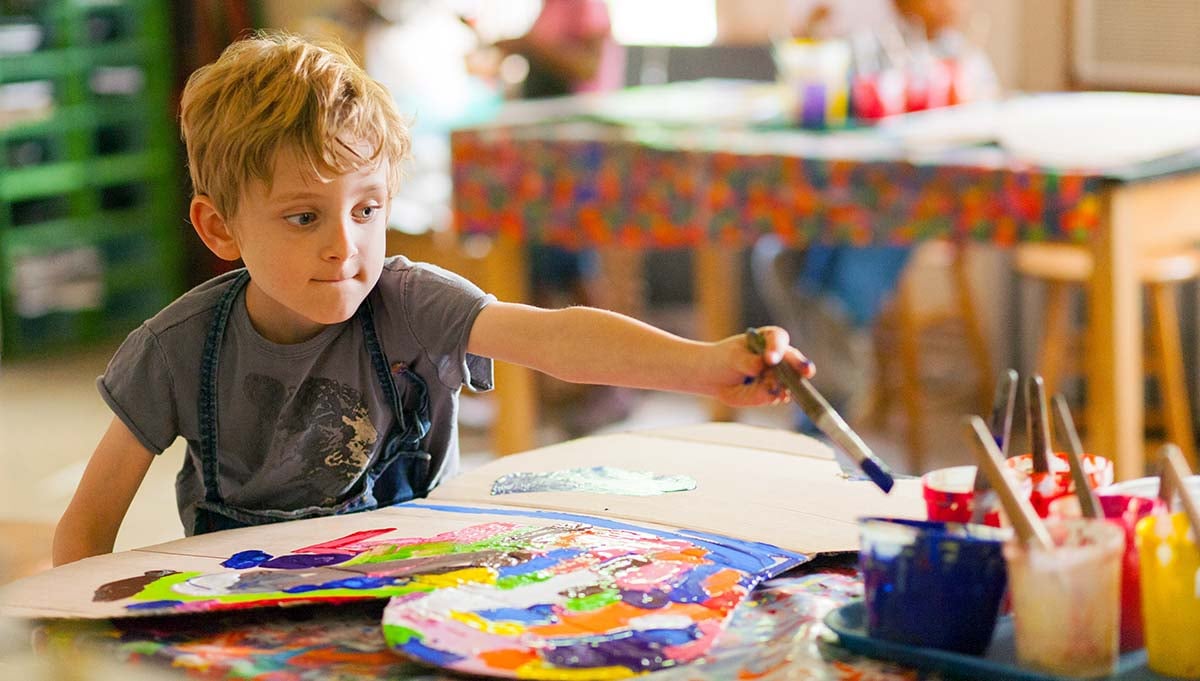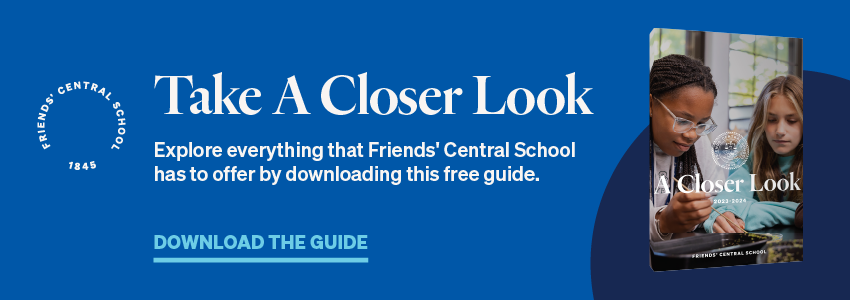
In every family, there comes a time when parents will need to decide whether they should enroll their child in a preschool, nursery, or other early childhood education program. Sometimes this is a necessity, especially for working parents. Sometimes it is just one of many options available, including potentially keeping a child at home or hiring outside help like a nanny. In either case, every parent wants to know: What is best for my child?
Whichever situation you find yourself in, you can breathe a sigh of relief, because there’s some good news when it comes to enrolling a child in preschool: Years of studies and research tell us that children who attend preschool are better prepared for kindergarten and are more likely to succeed than children who don’t attend. And that’s because these programs bring a long list of benefits to the table that can be difficult to achieve solely at home.
Ready to take the next step? Come visit Friends' Central to see what we're all about!
Here, we look at 6 important ways that preschool can benefit your child.
1. Preschool gives your child an academic head start.
One of the more obvious benefits of preschool and other early childhood education programs is the fact that they help lay the groundwork that a child needs to be successful in kindergarten and beyond.
Preschool programs often aim to familiarize children with everything from their ABCs (letter recognition, basic reading skills) to numbers (basic addition and subtraction) to specials like basic science, history, and even foreign languages. This foundation, reinforced with what they’re already learning with you at home, is critical to everything they’ll learn going forward.
And they’ll accomplish this learning while singing, dancing, playing games, and otherwise having fun!
2. Preschool will help your child develop critical social skills.
In addition to learning important academic lessons, children enrolled in preschool programs have an added benefit of having more practice when it comes to their social skills. The foundation of these skills are laid at home when a child learns the proper ways to interact with siblings, cousins, and playdates, but expand greatly when your child has the opportunity to be around other children outside the household.
And that makes preschool the perfect place for your little ones to start practicing their social skills and learning new ones like:
- How to share and take turns
- How to control their emotions
- How to make friends
- How to tune out distraction
- How to interact with adults from outside the family
All of these social skills will come in extremely handy for the more structured setting they’ll experience in kindergarten, and will make it easier for them to adapt.
3. Preschool helps build fine motor skills necessary to success.
If you hand a crayon to a three year old and ask them to draw you a house, chances are good that the picture you get is going to look more like a bowl of spaghetti than a house. Even if a child knows what a house looks like, they likely just don’t have the fine motor skills and hand-eye coordination required to complete the picture.
Luckily, the hands-on nature of most preschool activities all work to help your child build those fine motor skills and become steadier. In fact, the activities offered in preschool settings are typically designed to specifically aid in fine motor development. Everything from holding a pencil to buttoning their jacket, gluing elbow macaroni to construction paper, and hand-signing along to The Itsy Bitsy Spider will help further develop those skills.
And those fine motor skills matter. Developing those skills early will allow your child more ability and freedom to pursue necessary tasks, and may even have an impact on future academic success. A number of recent studies have found that early fine motor skill development were a predictor for math and reading achievement in elementary school and beyond.
4. Preschool is a baby step into the more structured setting of kindergarten.
Teaching your children about rules and structure is a natural part of being a parent. That’s why we tell them “no” to things that might be dangerous, why they can’t have cookies for dinner, and why we make sure they stick to a schedule. But even the most structured of home settings is vastly different from what a child will experience in kindergarten, where they’ll be expected to raise their hand when they want to speak, follow instruction, and pay attention.
Though not as structured as kindergarten by any means, preschool begins to introduce children to the structure that they’ll encounter in the grades above. This will make that future transition much easier for everyone involved.
This structure also introduces children to the basics of self-care, reinforcing positive behaviors that parents introduce at home. Daily tasks like helping to set up for an activity, cleaning up after play, washing hands before snacks, etc. all help children learn to be accountable to both themselves and others.
5. Preschool will give your child a chance to be independent.
Building independence is an important part of growing up, and the sooner that children are able to start practicing those skills, the better equipped they’ll be when they enter kindergarten.
Preschool helps children flex their independence muscles in a number of ways. They may be encouraged to make decisions for themselves (in terms of what snack they’d like to eat, or what activity they’d like to take part in). They will be encouraged to make their own friendships (with guidance, of course). And they’ll be encouraged to ask questions and explore.
All of these skills will be helpful as your child continues to develop academically and socially—really, on all levels.
6. Preschool exposes children to people different from themselves.
Preschool is a great way to begin teaching children the important lessons of diversity, and it achieves this by introducing your child to other children from different cultural, religious, and economic backgrounds. This is done through both the curriculum—through books and stories about characters from all across the world, for example—as well as through the direct experience of working, learning, and playing with children and teachers from other backgrounds.
Frankly put, diversity lays the foundation of equality and fairness, important qualities for children to have, and helps children learn to respect both each other and themselves. Students who attend high-quality preschool programs are taught to celebrate both the similarities and differences that we all have.
And diversity also plays a positive role in academics. By introducing your children to the life experiences of others, they can begin to view the world from perspectives other than their own, aiding in critical thinking and even in cognitive and language skills.
More Than Just ABCs
Preschool isn’t just about teaching your child their ABCs and their 123s. It’s also an opportunity for them to begin developing important social skills, grow their fine motor movements, and ease into the more structured school setting that they’ll experience in kindergarten. All of this while encouraging them to develop independence and a loving, caring attitude for others. It’s all of those benefits taken together that really make preschool so important for young children.



